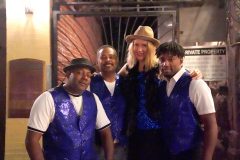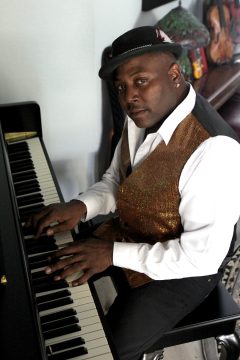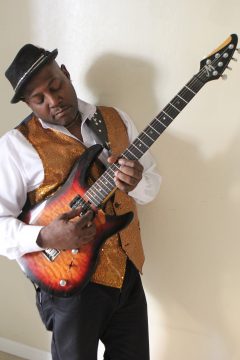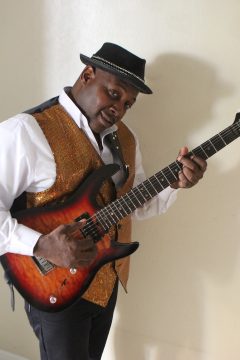Cover Story
FUZZY’S GUMBO: Lenny Rankins Stirs the Pot

Fuzzy Rankins with his band: Ron Bonslater (bass), Hindy Bare (keys), Abram Majors (drums). Photo: Kamaryn Peters.
When you walk into a Fuzzy Rankins show, there is an element of the unknown. It’s only later that you discover that anticipation is an active ingredient in the Rankins experience. There are also guarantees that go with your entertainment choice. They include, but are not limited to, a highly energetic program that is both musically diverse and fan-interactive. The best part is that you’re surrounded by other music enthusiasts that are also there to experience Fuzzy’s amplified and hyperactive labor of love, up close and personal.
Rankins is probably best known for his Grammy-winning collaboration with Ike Turner, but his fans will tell you it should be for his live performances. The Rankins music catalog is staggering and can range from gnarly 12-bar blues to blunt force funk. The band will entice you onto the dance floor with a variety of sweet jazz rhythms and soulful R&B, then rock ‘n’ roll you into a frenzied sweat. So when we began our conversation, we started with describing the Rankins sound. “It’s like a gumbo.” Fuzzy smiles. “A gumbo of different music, you know what I mean? Combined together with different elements of jazz, blues, funk, rock, and all the stuff I’ve played before…”
Born in Cleveland and raised on the East Coast? “Yeah!” Fuzzy says. “We moved from Cleveland when I was little to Wilmington, Delaware. I stayed in Delaware till I was nine or ten and then moved to Pennsylvania.”
Was your family musical? “My mom was a dancer and she liked to sing a little bit. My grandpop used to play the harmonica a lot; he was a good harmonica player. My brother played bass.”
Was it always guitar for you? “Well, I started messing around with singing, because we had to sing everyday at the church and then started playing the guitar when I was little.”
What was it about that instrument? “I don’t know, man, it was the sound. My cousin had a band when we were young and we would go to their show rehearsals at the YMCA. One guy had a nice little red guitar and I liked that.”
A lot of musicians grew up in church with the gospel influence… “Well that’s what I was around the most in Wilmington. My brother and I, and the young man across the street, would come up with little songs, playing what we wanted. But Sundays we had to sing gospel songs.”
You sang and played guitar; you were a double threat early on? “Yeah, when I started out playing guitar on shows, no one knew I could sing. But when people wouldn’t step up to the plate, I’d say, ‘Oh yeah, I’ll do it!’ And I’d take over and do it to keep things moving. I was always happy to be in the back and play, but I always ended up in the front.”
Let’s talk about other influences, other than the church. “I liked the jazz and stuff. I used to listen to George Benson, Al Di Meola, and Lee Ritenour. Basically, I’d just put the radio on, sitting in my room, and I’d just play every song that came on. They’d play it in rotation and I would just keep playing and learning all these songs. Whatever came on I’d try to tune into it, learn it and play it before the song went off.”
Was there a moment when you thought, this is what I want to do with my life? “When I came out to California… back on the East Coast it was like a hobby, and I would just do it on weekends. Going out playing gospel and just having fun, but I had to go to work.”
Did I read that you were only 16 when you found yourself on stage with the Rev. Al Green and the Blind Boys of Alabama? “Actually,” Fuzzy laughs. “I started going out with them when I was 12! I would go to school and we would have shows with these top players so they would pick us up after school and bring us back before we had to go to school on Monday. We would do like Friday and Saturdays and Sundays as long as I was back by for school on Monday morning. We’d kick it.”
At 12 years old? “I was doing it at 12 when I started getting out there. I had people around me, but they wanted to take me because I could play, you know? That was my thing to do, instead of runnin’ in the streets.”
Tell me about God’s Angels? “That was gospel group and it was doing real good. Young boys on the road it was kind of like the New Edition, only in the church. We had a whole different sound and new technology but they had to move back to Virginia. I wasn’t going to move backwards so I started doing R&B. I didn’t really like R&B at the time or think about joining a band, because I was doing the Christian thing and I was trying not to mix the two. But I started doing different shows with different people and I came out here [to California] in 1990.”
Did you know people out here? “A friend of mine and former bandmate was already out here, but nothing was happening so I thought I just go out and do my own thing. But I only had a year to be out here and make something happen.”
You seem to be able to musically absorb almost anything; who haven’t we mentioned as an influence? “When I had my band, we opened for Walter ‘Wolfman’ Washington at a club similar to Patrick’s. It was the first time I heard that joker sing and I’m like, ‘That’s who I’m talking about, he’s really on the funky side!’ He’s cold and had this nice tone in his voice and all the minor chords and grooves in there. Oh, okay this joker’s gettin’ it in! Yeah, he’s gettin’ it IN!” [laughing] “And Millie Jackson, too! Oh, she’s on the touchy side.” [laughing] “I was like, ‘Oh, you can do that? Oh… sister!’ [laughing] Let me get a little bit of that!” [laughing] “She’s up there singing on the bar, with a bottle. I hadn’t seen anybody get freaky like that, she had the men rollin’!”
You’ve played with so many people over the years, any memorable players? “We opened for Gatemouth Brown at the Belly Up in the late ’90s. Etta, Bobby ‘Blue’ Bland we did a lot of stuff with him. B.B., we had a little thing with him.”
Do you still listen to a lot of different music? “I watch everything and I look at everything. I listen to country stuff, Indian music, I like it all. I don’t have preferences… I listen to all that stuff.”
You started your own band, Fuzzy and the Bluesmen, in the early ’90s. “I hadn’t been home for awhile.” Fuzzy says. “And I was playing with Fro Brigham and he got sick. They said, ‘We’re not going to be able to do any shows until he gets better. I knew all the songs ‘cause I’d been playing with him and I’m getting ready to be out of job! I need to pay some bills around here. They said they needed somebody to sing. So I said, ‘I’ll sing, I’ll sing the stuff.’ They said, ‘You sing? Let’s hear it.’ They were shocked, because I was just the guitar player. He ain’t paying me enough to do both.” [laughing] “You know what I’m saying?’ We started up and I did his whole set and they said, ‘We didn’t know you had all that in you.’ So I started doing all the singing and I wanted to move on anyway and do something different, you know? By the time Fro got back there was a line around the corner to see me. And I’m getting the same pay and all that, so I told Fro I’m hooking up with another guy on guitar and start my own thing. I started working at Croce’s and runnin’ from club to club.”
This was ’92 or ’93? “Yeah, it was somewhere in that time frame. Everything was moving so fast back then. I went into the studio and started cutting things because that was my thing, it was what I was doing back East–studio work and session work.”
About that same time you were gaining some national exposure on radio and television? “Yes, the Jerry Lewis Telethon and a couple of radio shows. They started playing my stuff on the radio and I was opening for Toni Tone and Basic Black, learning more and more about the business side of music. Seeing all the acts, how they set stuff up, and how they networked and I said, ‘Oh, man, I’m gonna do the same thing. And it started happening.”
Do you play acoustic guitar often? “I’ve got a whole acoustic set I do, different stuff when I want to do it. And that always works because acoustic sells and you’ve got everybody playing the top of the neck and most of the acoustic stuff will work. But at this time, I want to shake a leg, you know?”
Let’s talk about writing; you do a lot of original material, do you have a process? “I was always into writing my own stuff. When I write, I’ll throw some chords down, a four-bar chord, and loop it and sing something to it. Or sometimes I’ll just sit with a guitar and do little things with a nice little groove or something and just add the drums and all that stuff.”
You always write with the guitar? “Yeah, I write with it sometimes. A piano or guitar, sometimes I’ll pick up a bass and start thumpin’ a bass line.” [Fuzzy’s hands pop up and he simulates slapping a bass…] “You can get some nice bass lines playing different stuff. You can hear the parts, if you’re playing funk or anything in between you throw a little lick in.”
Let’s talk a little about your first album… “When I did the first album and we tried to put it in stores, it was like, ‘Well, what is it?’ What category do we put it in? At the time I wasn’t thinking about a category, I was thinking that these are some cool songs. When they asked, I said I’m doing the blues. You can call it blues or whatever you want to call it. If you listen to it, it’s got like some R&B stuff, soulful stuff we were doing back East. So, I figured if I give them a gumbo of that…but if you listen to it there’s country stuff on it. It’s a gumbo of everything.”
Songwriting seems almost effortless to you. “I can make a song out of anything,” Fuzzy says. “You know writing gospel and putting stuff together like that is easy because you’re just really telling a story. Listening to other albums like Mahalia Jackson, you hear how they work the crowd. You can feed off the crowd. Your energy comes from the crowd. That’s how we play the kind of songs that we do. You get that feeling and you can always switch it up. All these people don’t want to just sit and listen to you. ‘Oh, that scale was nice. Oh, that drum line was cool.’ No, they’re partying, ‘Oh, I want to feel the groove!’ If you do something and it jumps out on them, it gets their attention and they’re the ones that are going to remember, ‘Well I’m going to look him up.’ I’m going to find out this, I’m going to find out that.”
You toured in Europe, good memories? “We jumped around all kinds of different places, playing, and I’m on the radio with these people. We rolled down where the Beatles played; I jumped up on stage and was playing by myself at the Cavern Club in Liverpool. I got in a car and I was driving on the wrong side of the street. I’m just cruisin’ and there’s a truck in my lane! I’m thinking, ‘What’s he doing?’ [laughing] “Oh, I’m in a different country!’ I’m trying to kill myself.” [laughing] “I definitely want to go back.”
You even have film and theater background? “I wrote a couple of movies and I’m into all kinds of stuff. I was going to do some R&B work with All for One and I went up to L.A., but the project was delayed. Well, I had to make something happen now. In the meantime the show Nuthin’ But the Blues came to town and I get a call from Ron Taylor. They were looking for somebody to fill the role of Robert Johnson. And I said, ‘Nah, I’m good man.’ But he said just stop on by, so I went over to his house. I get over there and he says, ‘You look perfect, you kind of look like Robert Johnson.’ You know how they try to make you feel like…” [laughing] “He asked if I knew any blues songs. And I said, ‘I know a lot of blues songs.’ So I played some and he goes, ‘Oh, that’s what we need right there! If you want to do it, meet us in San Diego, come and audition.
How much acting experience did you have? “I did some acting when we were young at the Christmas Center and YMCA, they all had events.”
Not to mention a lifetime of being a musician. “Well, I got into that and they wanted me to start understudying the other parts and had to learn all their parts, all of them. But then my CD came out and we went to Panama and the show went to New York, but I was the first one in that show.”
Let’s talk about your work as a producer. “I’ve been teaching people to sing professionally–vocalists and with groups–but I didn’t get into real producing till I moved out here [San Diego]. The production side back then started with a keyboard. You program a little bit on a keyboard and just play it. Well, I had a keyboard player I was trying to rely on and it didn’t happen. Instead of showing someone else, I decided to just do it myself.”
A producer is born. “I just did it myself and started coming up with my own songs or what was in my head. I knew how the drum beat would go in my head, or the bass line; I just wasn’t a fancy keyboard player. I had to switch my brain and learn how to play it to get what I want. So I can produce anything I want to do now.”
You also have studio session player in your resume. “I’m working with a lot of people right now, different names and some new rap material. I did a lot of stuff with Ike [Turner]. He found out I was working with the gaming people and he heard some of the things I’d done. He would come down to my show at Croce’s and tried to get me to come up to his place in San Marcos. Some friends of mine wanted to go up, so I said okay. I went up and we started playing, but I already had my own thing. Ike said, ‘I don’t care if you’re doing your own thing, but when you ain’t doing your thing, can you do your thing with me?’” [laughing]
Ike Turner was legendary. Was it hard to say no to him? “No, because I didn’t know him like that, I’m not into people like that. I’ve been around so many professional people… you know how people get excited, ‘Oh, that’s my favorite artist!’ I just don’t do that. I don’t know why.”
Probably because you’ve been in the music business since you were 12! “Probably,” Fuzzy agrees. “I’ve been around a lot of artists like that. I normally heard about Tina, but not him and Tina’s got her own thing, but this is Ike. He kept giving me his picture and his card [laughing], saying, ‘Give me a call.’ Oh, okay, but dude, I’m busy.” [laughing] “My friends kept saying, ‘Dude, that’s Ike Turner! And I kept saying, ‘I don’t care. Ike’s got his stuff going… I’m trying to get MY stuff going, player!’” [laughing] “You know what I’m saying? Don’t get me wrong, I respected what he was doing and in my frame of mind I think that’s why he took to me, because I didn’t want anything from him. A lot of guys would go up there and he’d have gear, compressors, and stuff around and they’d say, ‘Hey, Ike, what are you doing with that?’ They always wanted something. But I was never like that, and he knew that.”
Let’s talk about recordings that you made with him. “We had a whole lot of stuff when he passed away. We were coming out with a whole new thing. We did 40 tracks in one night, we just bounced them out. We had Snoop Dog and everybody that was new. And I was giving him that big, fat sound. Take this and put that underneath of that, that’s what I do. And that’s what he liked, so he kept me around.”
Those recordings produced a Grammy. “I had just walked in the studio and we were just jamming, and Ike said, ‘Hey, man, I got a cool song and I want you to play on it. So he started kicking it and he was groovin’ and I started playing along with it. Next thing you know, he was recording the whole time and that was it. I didn’t hear the song any more until it came poppin’ up on the radio, named after me, ‘Jazzy Fuzzy.’ Ike called me and said, ‘Hey man, we’re making it big!’ And I’m going, ‘Who is…what are you talking about?’ [laughing] “He said, ‘Man, the song–you ain’t hearing the song?’” I said, ‘What song, we didn’t do a song together?’” [laughing] “He said, ‘You know the song, man. Listen to the song.’ Even in the studio he never said a word about putting it on the record… but it took off. The ratings were going crazy. But then they were going on tour and Ike told me I can’t play all that shit so you gotta go on tour with me. It’s only like three months or something. I told him, ‘Ike, I’ve got my own thing. I’d have to shut down all my stuff and you’re not paying me enough to do that.’ You know if you come up with good numbers to keep me rolling and to pay my bills. I knew that wouldn’t happen, so I didn’t do it, but we didn’t fall out over it. It was all good.”
Playing live seems to be “home” for you. “It’s always been live shows for me.” Fuzzy says. “I’m used to the crowds and all that. We were brought up; you want to stay, you gotta perform. If you’re just standing there, you got no energy [laughing] and you’ll break out in a cold sweat. I’ll get out there and do my thing, try to push everybody else to do the same. I want everybody to shine, not just me. And they can push it just like I can; you can get the most out of yourself. When it’s your time to shine, you need to shine! Sometime you take it to the extreme, like the drummer will take an extra solo, you want to get fancy because you saw a couple of beautiful ladies walk by and oh, you were suppose to stop there… oh, you got extra strength tonight? I need that strength when you start! [laughing] Not just when the women walk by.”
Another surprise: you’ve worked in the video gaming world for quite a while? “I started working with the gaming companies,” Fuzzy grins. “Programming, doing animation and sound effects. I was a sound engineer for them. Midway Games. I’m on ‘Spy Hunter’ and a bunch of the ‘Ready to Rumbles’ and they gave me the freedom to get into a lot more stuff.”
Something that is near and dear to you…Blues in the Schools. “Yeah, I’ve been doing that. I love teaching kids to play. When I was growing up people didn’t really want to show you stuff, because they thought it was their stuff. I never want to be like that. If someone wants to do something or learn something, I’ll show them. You have to put your work in, your time in. If you don’t practice it you won’t be good at it. The craft is what you put into it. You have to put in the time.”













